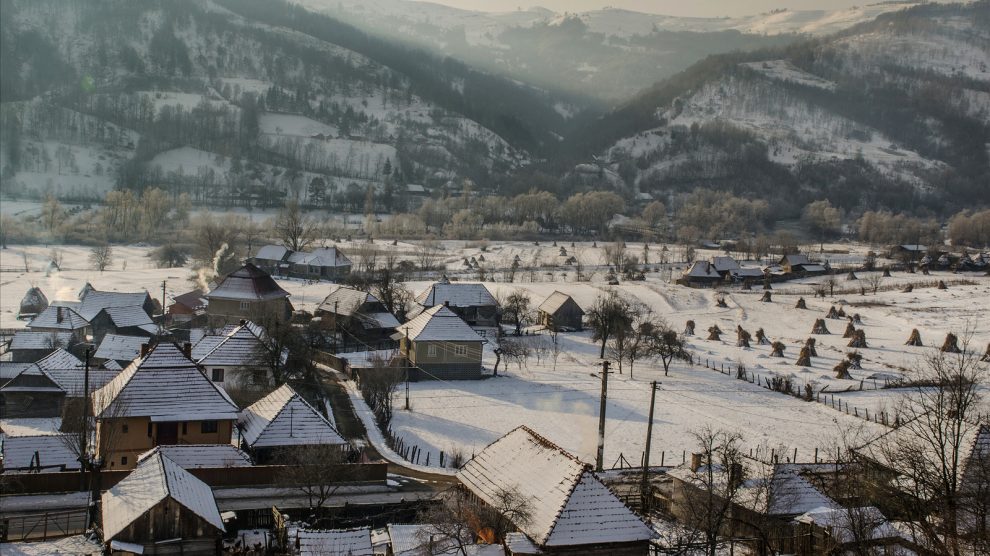A European Commission report has concluded that the burning of most forest biomass produces more greenhouse gas emissions than coal, oil and gas. The problem is particularly acute across much of Central and Eastern Europe.
The smell of burning wood is one of the defining memories of any trip – particularly in winter – to many rural communities throughout Central and Eastern Europe, where forest biomass is still used to heat tens of thousands of homes.
However, a new European Commission report has concluded that the burning of most forest biomass produces more greenhouse gas emissions than coal, oil and gas. In 23 out of the 24 scenarios the Commission’s Joint Research Centre (JRC) examined, biomass had a negative impact on climate, biodiversity, or both.
- In Estonia, Christmas trees are being turned into tonic water
- Can the Aral Sea ever recover? And is the Caspian Sea climate change’s next victim?
- The European bison is no longer a vulnerable species
Indeed the report finds that most of the forest biomass currently being burnt for energy in the EU not only increases emissions compared to fossil fuels, but does so for decades placing in peril the EU’s net zero emissions target for 2050 and the chances of stopping runaway climate change.
According to the Commission, the burning of biomass emits more than 350 million tonnes of CO2 per year throughout the EU.
Ironically, however, EU energy policy currently incentivises burning the type of biomass the Commission’s report shows is dangerous and counter to EU climate policy, which, according to the World Wildlife Fund (WWF), fails to draw the conclusion that current energy policy should be changed.
Instead, it calls for national corrective measures.
Shirking responsibility
“The Commission is shirking its responsibility,” says Alex Mason, senior policy officer, WWF Europe. “It basically admits in this report that EU bioenergy policies are accelerating climate change then lobs the ball into the court of member states to fix the problem. We urgently need biomass rules to be tightened in the EU Renewable Energy Directive before any more damage is done.”
Most of the EU member state National Energy and Climate Plans (NECP) do not include an adequate assessment of the potential impacts of expanding forest biomass harvesting on carbon sinks, biodiversity, water and air pollution.
The issue is particularly relevant to Central and Eastern Europe where firewood use (mainly hardwood) is still the only source of energy for heating in a large number of rural households. For example, a 2011 study in Romania calculated firewood consumption of 19 million cubic metres in 2009 in a total of 3.5 million households, while in Bulgaria, a 2012 study estimated that biomass supplied 32 per cent of household heating demand.
Of great concern is the fact that there are plans to increase biomass use in the CEE region even further, as the current draft NECPs in most EU CEE countries foresee an increased use of forest biomass both in the industrial sector and household heating.
For example, Bulgaria plans to increase biomass use for heating by 44 per cent, and this is projected to be the only type of renewable energy that will expand through 2030. This also means there would be an increase in the number of households using biomass (firewood) from 1.1 million in 2016 to 1.7 million in 2030 – nearly 80 per cent of households.
The Bulgarian National Forest Biomass Energy Action Plan for 2018-27 sets out the potential for the use of wood biomass for the production of (industrial) heat and electricity at 6,067,222 cubic metres per year. The same plan states that the amount of firewood used in 2016 was 5,714,529 cubic metres (which in turn represented 84.25 per cent of the volume of legally harvested wood that year).
Use could double by 2030
Given that the majority of firewood was used by households, the result of the plan could see biomass use double by 2030, including a substantial increase in harvesting solely for energy purposes. Taking into account illegal logging of perhaps two million cubic metres per year, this suggests that Bulgaria could be harvesting close to its full annual increment in biomass growth per year, to a large extent for energy production.
Similarly, the draft Hungarian NCEP projects biomass-based generation capacity to increase by 50 per cent, and the volume used in heating to grow by 13 per cent – taking biomass to 88 per cent of total renewable heat in 2030.
To prevent the risk of mass deforestation and increased pressure on forests, WWF-Bulgaria, WWF-Hungary and WWF-Romania are working to limit the additional demand for forest biomass for energy.
Developing alternatives
Within the framework of the BIO Screen Project, funded by the European Climate Initiative (EUKI), WWF and its partners are assessing the potential of forest biomass in Bulgaria, Hungary and Romania.
The hope that this analysis will then be used to calculate the energy needed while still achieving 2030 and 2050 decarbonisation targets.
In addition, BIO Screen will impact the biomass-to-energy policies in the CEE region through the development of advanced evidence-based knowledge and policies for preventing an increased dependency on forestry biomass for energy, especially as a result of the transition from coal; and for preventing the expansion of subsidy schemes for energy utilities to use forest biomass.
“We are developing criteria in the BIO Screen Project for the sustainable exploitation of the available potential so as not to allow overexploitation of forests,” says Georgi Stefanov, climate and energy practice lead at WWF-Bulgaria.
“Based on these criteria, we will calculate how much biomass should be included in the NCEPs of Bulgaria, Romania and Hungary. Together with local and national government representatives, we will also develop alternatives to firewood-based household heating in six pilot municipalities in these countries.”
Unlike many news and information platforms, Emerging Europe is free to read, and always will be. There is no paywall here. We are independent, not affiliated with nor representing any political party or business organisation. We want the very best for emerging Europe, nothing more, nothing less. Your support will help us continue to spread the word about this amazing region.
You can contribute here. Thank you.








[…] Source link : https://emerging-europe.com/news/why-cees-rural-communities-need-an-alternative-to-bur… Author : Publish date : 2021-02-01 14:00:54 Copyright for syndicated content belongs to the linked Source. […]
[…] Why CEE’s rural communities need an alternative to burning wood for fuel […]